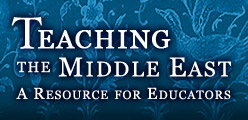Has There Been a Clash of Civilizations Between the Middle East and the West?
In recent years, the argument that there is a fundamentally antagonistic relationship between Western culture (meaning more or less that of Europe and the United States) and Islamic culture has become very popular. Terrorist activity by Islamic militants is the most often cited example of this alleged phenomenon.
While Muslim terrorist organizations have certainly demonstrated hostility toward Europeans and Americans, as well as toward Muslims with worldviews different than their own, this is not representative of Muslims in general. Such movements are an outgrowth of a wide variety of factors, including past and on-going involvement of foreign powers in Middle Eastern affairs, as well as of the debate over whether or not it is possible to be modern without becoming Western. But for most people in the Middle East, these concerns lead to political activism and to a thoughtful examination of how to incorporate the beneficial aspects of contemporary global culture without losing a sense of who they are and where they have come from — the history and culture that make them unique. Many in the Middle East strongly believe that part of that uniqueness involves religious values.
Moreover, this debate has not been limited to the Middle East, but rather has been carried out across the world in many places where European empires imposed their power or where the conditions of modern life have caused significant social upheaval and dislocation, including the United States. The religious revival and the increased incorporation of religious parties in politics that has taken place around the globe since the 1980s, particularly but not only in formerly colonized lands, is a reflection of the widespread nature of this debate.
Supporting Links:
Huntington, Samuel P. “The Clash of Civilizations?” Foreign Affairs, Summer 1993. Link to resource![]() (accessed April 30, 2010).
(accessed April 30, 2010).
Krämer, Gudrun. “What’s the Real Difference?: Islam and the West.” Religion. Der Spiegel Online – International, January 23, 2007. Link to resource![]() (accessed April 30, 2010).
(accessed April 30, 2010).
Said, Edward W. "The Clash of Ignorance" The Nation, October 4, 2001. Link to resource (accessed October 6, 2010). Link to resource![]()

A. Holly Shissler
Associate Professor of Ottoman and Modern Turkish History, University of Chicago
 Erin L. Glade
Erin L. Glade
Ph.D. candidate, University of Chicago
Guiding Questions
1. What are the problems with thinking about recent conflict between “Western culture” and “Islamic culture” as a clash of civilizations? Why might this not be accurate? What are the effects of looking at the problem in these terms?
2. What are the factors that have lead to the growth of Muslim terrorist organizations in the Middle East? How has the average person in the Middle East reacted to those factors?
3. How does the resurgence of religion in the politics of the United States compare to that in the Middle East?


 Print Page
Print Page
